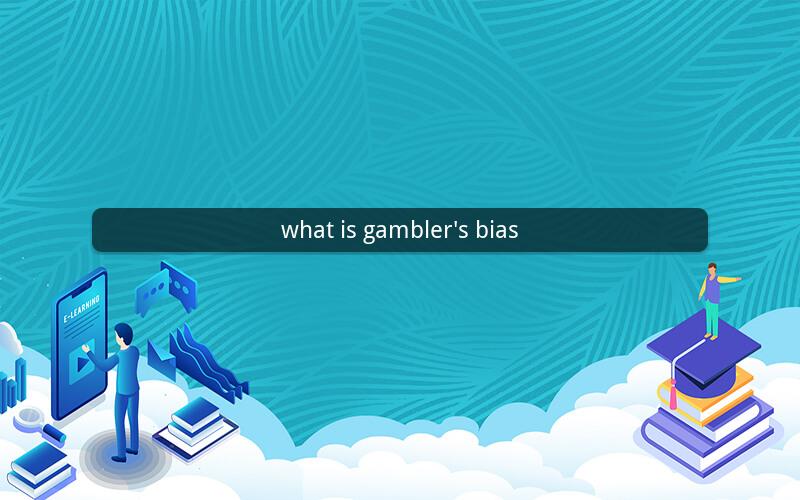
Understanding Gambler's Bias
Table of Contents
1. Introduction to Gambler's Bias
2. The Psychological Roots of Gambler's Bias
3. Common Symptoms of Gambler's Bias
4. The Impact of Gambler's Bias on Decision Making
5. Strategies to Overcome Gambler's Bias
6. Case Studies of Gambler's Bias in Practice
7. Conclusion
1. Introduction to Gambler's Bias
Gambler's bias, also known as the Monte Carlo fallacy, is a cognitive bias that affects individuals when they believe that a random sequence of events is more likely to change after a series of outcomes that seem to contradict the expected probability. This bias is particularly prevalent in gambling scenarios but can also influence decision-making in various other contexts.
2. The Psychological Roots of Gambler's Bias
The psychological roots of gambler's bias can be traced back to several cognitive factors. One of the key factors is the overestimation of the influence of recent events on future outcomes. This overestimation leads individuals to believe that a sequence of random events is more predictable than it actually is.
Another contributing factor is the confirmation bias, where individuals tend to search for, interpret, and remember information that confirms their pre-existing beliefs. When faced with a sequence of outcomes that seem to contradict the expected probability, individuals with gambler's bias are more likely to ignore the underlying randomness and focus on the apparent pattern.
3. Common Symptoms of Gambler's Bias
Several common symptoms can indicate the presence of gambler's bias. These include:
- The belief that a random sequence of events is more likely to change after a series of outcomes that seem to contradict the expected probability.
- The tendency to continue betting or making decisions based on the belief that the next outcome will be more favorable.
- The failure to recognize that each event in a random sequence is independent of the others.
4. The Impact of Gambler's Bias on Decision Making
Gambler's bias can have significant negative impacts on decision-making. In gambling, it can lead to excessive betting, financial loss, and addiction. In other contexts, such as business or investment, it can lead to poor decision-making, missed opportunities, and increased risk.
5. Strategies to Overcome Gambler's Bias
Several strategies can help individuals overcome gambler's bias and make more rational decisions:
- Recognize the existence of gambler's bias and be aware of its potential influence on decision-making.
- Remind yourself that each event in a random sequence is independent of the others.
- Use mathematical probabilities to assess the likelihood of future outcomes.
- Seek out diverse perspectives and information to counteract confirmation bias.
6. Case Studies of Gambler's Bias in Practice
Numerous case studies have demonstrated the impact of gambler's bias in various contexts. For example, in the stock market, investors may believe that a stock's recent performance will continue, leading to poor investment decisions. In sports betting, gamblers may believe that a team's recent win will result in more wins in the future, leading to overconfidence and increased betting.
7. Conclusion
Gambler's bias is a cognitive bias that can significantly impact decision-making in both gambling and other contexts. By understanding its psychological roots, recognizing its symptoms, and implementing strategies to overcome it, individuals can make more rational and informed decisions.
Questions and Answers
1. What is the main cause of gambler's bias?
- The main cause of gambler's bias is the overestimation of the influence of recent events on future outcomes.
2. How does confirmation bias contribute to gambler's bias?
- Confirmation bias contributes to gambler's bias by causing individuals to focus on information that confirms their pre-existing beliefs, ignoring contradictory evidence.
3. What are the common symptoms of gambler's bias?
- Common symptoms include the belief that a random sequence of events is more likely to change, the tendency to continue betting based on this belief, and the failure to recognize the independence of events in a random sequence.
4. How can gambler's bias affect decision-making in the stock market?
- Gambler's bias can lead investors to believe that a stock's recent performance will continue, resulting in poor investment decisions.
5. What are some strategies to overcome gambler's bias?
- Strategies include recognizing the bias, reminding oneself of the independence of events, using mathematical probabilities, and seeking diverse perspectives.
6. How can gamblers avoid falling victim to gambler's bias?
- Gamblers can avoid falling victim to gambler's bias by setting a budget, understanding the odds, and not chasing losses.
7. Can gambler's bias affect decision-making in sports betting?
- Yes, gambler's bias can affect decision-making in sports betting by causing individuals to believe that a team's recent win will result in more wins.
8. What is the Monte Carlo fallacy, and how is it related to gambler's bias?
- The Monte Carlo fallacy is a specific type of gambler's bias where individuals believe that a random sequence of events is more likely to change after a series of outcomes that seem to contradict the expected probability.
9. How can businesses mitigate the impact of gambler's bias on their decision-making processes?
- Businesses can mitigate the impact of gambler's bias by implementing data-driven decision-making, encouraging critical thinking, and providing training on cognitive biases.
10. Is it possible to completely eliminate gambler's bias?
- While it is challenging to completely eliminate gambler's bias, individuals can significantly reduce its impact by being aware of its existence and employing strategies to counteract it.